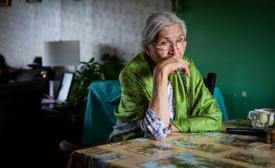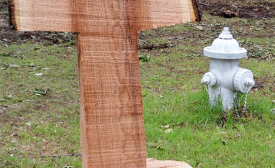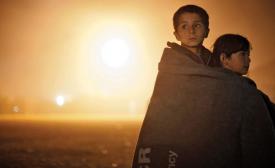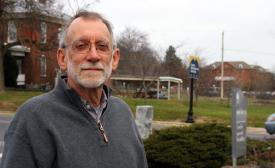Ontario indigenous woman awarded Sattler Peace Prize
Judy da Silva, a member of the Grassy Narrows First Nation in northwestern Ontario, was this year’s recipient of the Michael Sattler Peace Prize from the German Mennonite Peace Committee.
Judy da Silva, a member of the Grassy Narrows First Nation in northwestern Ontario, was this year’s recipient of the Michael Sattler Peace Prize from the German Mennonite Peace Committee.
“Every night I go to bed thinking about what I will feed my family in the morning,” says a Syrian woman who fled with her family to a refugee settlement in Sidon, south of Beirut, Lebanon.
After Iranians replace Mahmoud Ahmadinejad, a two-term president, in this month’s elections, much of the world will remember him as an enigmatic hardliner from a far-off place. They will remember a stern, blustery man whose nuclear dabbling and inflammatory rhetoric about Israel and America seemed to invoke George W. Bush’s inclusion of Iran among the “Axis of Evil.”

Madeline Spence of the Nisichawayasihk Cree Nation at Nelson House, Man., says ‘Our land used to be so good; the shorelines used to be so different.’
The director of Mennonite Central Committee (MCC) Manitoba at the time told me two issues stirred up the most flak from constituents: MCC’s work in Israel-Palestine and its involvement with hydropower issues in the north.
That was a dozen years ago. I was MCC’s hydro guy.
The tiny hamlet of Mather in southwestern Manitoba is home to about 100 people, but for one night of the year the population burgeons. On April 13, the Mather community held its annual coffeehouse at the community hall, drawing about 130 people from far and wide.

This cross was carved out of a downed tree after a deadly tornado struck Joplin, Mo., on May 22, 2011. At a celebration to commemorate two year’s of rebuilding efforts, Kevin King, executive director of Mennonite Disaster Service, said of the carving, ‘It is now weathered and cracked from the drying sun, proclaiming the injury of the past.’
Nearly two years after an EF5 tornado struck Joplin, Mo., Mennonite Disaster Service (MDS) closed its project site in Joplin with a celebration.

A crowd of about 60 people of various ages, almost all from Mennonite congregations, gathers outside the chain-link fence of the Enbridge pumping station near Gretna, Man., for a service of lament on Holy Saturday.
A cross in the ditch is a common marker for tragic events, so on Holy Saturday, March 30, a wooden cross is planted in the snowy ditch just outside the chain-link fence of the Enbridge oil pumping station near Gretna.
Jonah Langelotz and three of his classmates needed to participate in a nonviolent action for their History and Strategies of Nonviolence course at Canadian Mennonite University (CMU). It did not take them long to decide on an issue.

Jim Cornelius, left, Foodgrains Bank executive director, presents a glass grain elevator—an “image of what the Foodgrains Bank has stood for and meant across the country”—to CIDA president Margaret Biggs and Julian Fantino, federal international cooperation minister. At right is Don Peters, the Foodgrains Bank’s board chair.
Helping people in need overseas is not only a “tangible expression of Canadian values,” but also a “critical instrument for advancing Canada’s long-term prosperity and security.”
Government and media often brand people who have committed offences as “bad guys” to be feared and put away. But that’s not how their kids see them. In What Will Happen to Me? a 2011 book, Lorraine Stutzman Amstutz and Howard Zehr, the Mennonite pioneer of restorative justice, present the portraits and words of kids whose parents are behind bars:
In 1984, Cliff and Wilma Derksen’s 13-year-old daughter Candace was abducted and murdered. The case was not solved until 2011. Below are excerpts of Wilma’s presentation to a parliamentary committee considering Bill C-10 in November 2011. She speaks of her ongoing work with other victims of crime:
When John Hutton sees a person convicted of murder or assault, as he regularly does, he does not see a “bad guy” to be feared or reviled. Instead, he sees the potential for change.
From a wind-damaged Bible camp in northern B.C. to a flooded town in North Dakota, and even to storm-ravaged New York City, British Columbians gave of their time and talents to Mennonite Disaster Service (MDS) projects this past year.
Canadians of European ancestry generally don’t pay much attention to the benefits and advantages they enjoy because of their skin colour. So says Sue Eagle, a director of Mennonite Central Committee (MCC) Canada’s Indigenous Work program.
The hallways at Westgate Mennonite Collegiate in Winnipeg were abuzz with excitement. Eight students and their teacher, Emil Haloun, had arrived from Mar Elias High School in Ibillin, Israel, to spend two weeks with the Westgate students and their host families.
As a quiet first-year college student, I took a long, nervous walk down the dorm hallway, across a dimly lit ideological divide and into the room of the second-year student who had lumped me in with the non-intellectual, conservative evangelicals (not the camp I get pegged in these days).

Syrian refugee children take shelter against the cold shortly after arriving in Za’atari Refugee Camp, Jordan, early in the morning of Nov. 26, 2012. Mennonite Central Committee has delivered 900 comforters, 350 relief kits and 3,520 school kits to the camp so far. For story on the worsening crisis in Syria.
The crisis in Syria is rapidly spinning out of control.
Victor Khambil, secretary for the Chin Christian Church, Kitchener, was front and centre at a peaceful protest at city hall on Jan. 19.

Howard Zehr, widely known as the ‘grandfather of restorative justice,’ will co-lead the Zehr Institute of Restorative Justice at the Eastern Mennonite University (EMU) Center for Justice and Peacebuilding, Harrisonburg, Va. Zehr will step aside from his teaching responsibilities at EMU following the spring 2013 semester.
Howard Zehr, widely known as the “grandfather of restorative justice,” will step aside from his teaching role at Eastern Mennonite University (EMU) after the spring 2013 semester and begin co-leading the newly established Zehr Institute for Restorative Justice.
At a Brotherhood meeting in Altona, Man. last November, the Sommerfeld Mennonite Church decided to withdraw as one of the member churches of Mennonite Central Committee (MCC). The church—made up of 13 congregations, all in Manitoba—will no longer appoint representatives to the MCC Manitoba and MCC Canada boards.
Elaine Dueck, 15, eagerly anticipates the annual 64-hour around-the-clock meat canning operations when Mennonite Central Committee’s (MCC) mobile meat canner comes to her home community.
Many of the people displaced when rebel group M23 recently took control of Goma in the Democratic Republic of Congo had already been displaced a number of times earlier this year, says an MCC worker
Tears flow freely at Binti Mama (daughter/mother) gatherings as mothers and their teenage daughters talk openly about issues such as HIV and AIDS. Led by an intergenerational team of students, teachers and women, the gatherings provide a safe setting for listening and learning across generations.
Nancy Frey and Bruce Yoder are building a new home in Burkina Faso with their children Jeremiah and Deborah. In the capital city of Ouagadougou, the Frey Yoders connect with and help support the Foyer Evangélique Mennonite de Ouagadougou (FEMO), a congregation primarily comprised of young adult university students, 24 of whom live in the FEMO residence.
Students from Bethany College, Hepburn, Sask., spent Sept. 19-27 learning outside the classroom. While first-year students learned about poverty and homelessness by working in food banks and shelters in various cities, second-year students visited three Cree communities in Saskatchewan.